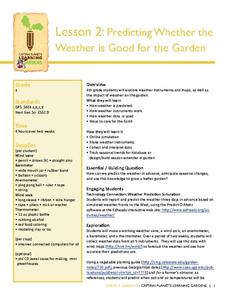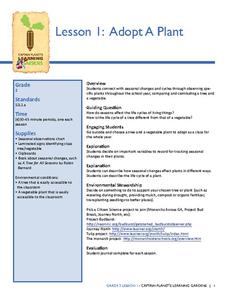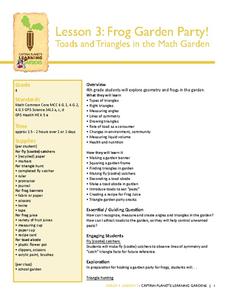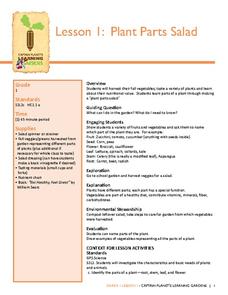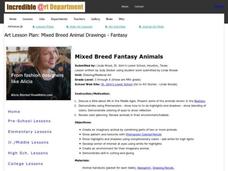Washington State Department of Health
Let's Cook!
Recipes, tasting activities, images of fruits and veggies, fun food facts... you name it, this resource has it! Your class will be cooking up wonderful dishes in no time with these materials. Included here are recipes, handouts,...
Smithsonian Institution
George Washington: A National Treasure
Take a closer look at the life and presidency of George Washington with this great set of lesson plans and worksheets. The resource includes a timeline of the president's life and multiple opportunities for primary source and image...
Asian Art Museum
Telling Tales with Kamishibai
Kamishibai (paper drama), is a Japanese form of storytelling that uses emakimono (paper picture scrolls), to relay a moral lesson. As part of a series of resources that examine Japanese art and artists, learners watch a video retelling...
Captain Planet Foundation
Predicting Whether the Weather is Good for the Garden
Can your class predict the weather? Show them how they can come close with a lesson about creating weather instruments, including weather vanes, barometers, wind socks, anemometers, and thermometers. Kids research weather patterns and...
Captain Planet Foundation
Help a Sister Out: Garden Companions
Explore Native American gardening traditions with a lesson plan on companion planting. Based on the concept that certain crops grow better when planted near other specific crops, kids research the gardening method with background links...
Captain Planet Foundation
Adopt-A-Plant
Note the way that plants change during the season by adopting a plant on your school campus. After your class chooses their plant, they research the plant's needs, how it differs from other plants, find ways to support their plant's...
Captain Planet Foundation
Square Foot Fall Garden
First graders learn the basic needs of plants and identify geometric shapes while planting a fall garden. Combining math and science in one lesson, the resource guides kids through starting their class garden as they discover the...
Captain Planet Foundation
Frog Garden Party! Toads and Triangles in the Math Garden
It's frog party time! With frog banners, frog juice, and a triangle hunt, your garden party is sure to be both entertaining and educational. The lesson plan connects geometry, earth science, and delicious snacks to teach kids about...
Captain Planet Foundation
Energy Flow in the Garden
How can you tell what an owl has eaten? Study the food chain and flow of energy in an ecosystem by dissecting an owl pellet and noting the bones found inside. Additionally, the instructional activity includes a game about consumers and...
Captain Planet Foundation
Worm Your Way Out of This
How can you provide healthy soil for your garden? Study worms, bacteria, and other microorganisms in a lesson about decomposition and organic compost. After discussing what you know about worms and watching a video, watch what worms do...
Captain Planet Foundation
Solar Cooking Race
Study heat transfer with activities that focus on how heat energy works. Using a solar cooker, ice cubes, and heat transfer bracelets, kids experiment and record what they find by keeping ice cubes cold and vegetables hot.
Captain Planet Foundation
Shape Shifters in the Math Garden
Combines mathematical measurement with gardening skills. Third graders hunt for worms in the garden and try to find the longest one. They also measure and weigh vegetables that they harvest from the garden, measure rainfall amounts, and...
Captain Planet Foundation
Rotting Away
What happens at the end of a plant's life cycle? Show kids the natural way that plants show that they're decomposing, as well as the importance of compost, with a lesson about living organisms. After reading Log Cabin by Anne Schreiber,...
Captain Planet Foundation
George Washington Carver and the Sweet Potato
Learn about George Washington Carver's important contributions to agriculture by studying the sweet potato. First graders read about the inventor's observations and prepare sweet potato slips for the class garden. Additionally, they...
Captain Planet Foundation
Plant Parts Salad
How are vegetables beneficial to a healthy diet? Have kids examine different types of vegetables, such as zucchini, broccoli, and carrots, and determine which parts of the plant they represent. Then, they taste the vegetables as a class....
Curated OER
Mixed Breed Fantasy Animals
Ever seen a crockapeep or a giraffule? How about a catmel? Elementary school artists are encouraged to let their imaginations roam and create images of imaginary creatures by combining parts of two or more animals,
TED-Ed
From Aaliyah to Jay-Z: Captured Moments in Hip-hop History
To take "the definitive portrait of that person in that moment" is the quest of photographer and hip-hop historian Jonathan Mannion. In this short video, Mannion details his dedication to his art and the process he goes through to catch...
NASA
Soda Straw Rockets
Three, two, one, blast off to a better understanding of force and motion with this exciting science lesson! Beginning with a discussion about rockets and gravity, young scientists go on to complete a series of worksheets about net forces...
English Enhanced Scope and Sequence
Identifying Synonyms
"Let the hunt begin!" As an introduction to synonyms, second graders generate a list of word pairs that have similar meanings. The words pairs are written on sentence strips, cut apart, shuffled, and distributed to class members who must...
American Chemical Society
Formation of a Precipitate
Conclude this chemical change unit by having your class combine two liquids that result in formation of a precipitate. The learners discover that chemical reactions result in new materials. Make sure to consider all of the preceding...
American Chemical Society
Comparing the Amount of Acid in Different Solutions
Upcoming chemists use chemical reactions to determine relative pH in two different acids. This is a terrific lesson plan for middle schoolers that can stand alone as a practice in precision and lab skills, or as part of the unit on...
American Chemical Society
Color Changes with Acids and Bases
Getting back to the beginning of the unit, learners use reactions with red cabbage juice to determine if solutions are acidic, neutral, or basic. This is a straightforward and classic investigation, but what you will appreciate is the...
American Chemical Society
Change in Temperature - Exothermic Reaction
Alone, or as part of the intended unit on chemical reactions, this activity allows learners to experience an exothermic reaction. Here, learners add calcium chloride to a baking soda solution and watch the temperature rise! They will...
American Chemical Society
Production of a Gas - Controlling a Chemical Reaction
Though the publisher designated this unit for use with third through eighth grades, this particular activity would be best used with middle schoolers due to the specific measurement skills required. Basically, they set up the reaction...





